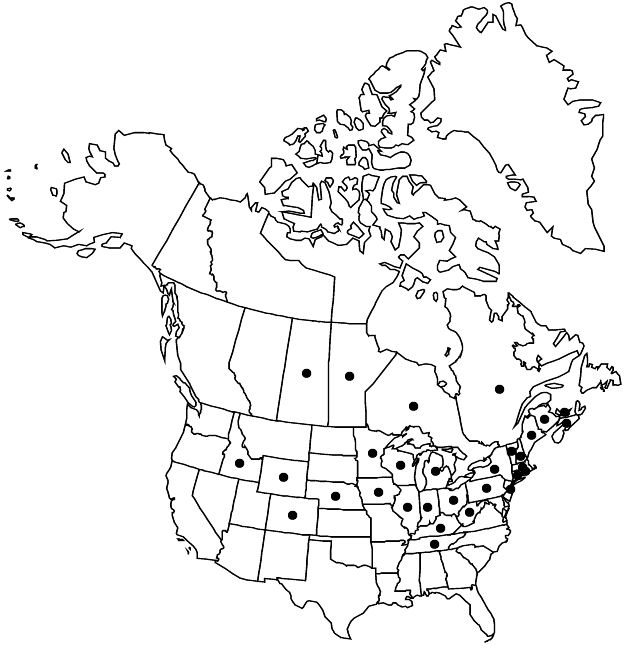Frangula alnus
Gard. Dict. ed. 8, Frangula no. 1. 1768.
Shrubs or small trees, 2–5(–7) m. Stems greenish to brown, sparsely puberulent, glabrescent. Leaves deciduous; petiole 10–19 mm; blade dull green abaxially, glossy darker green adaxially, broadly elliptic-obovate to broadly elliptic or broadly oblong, 4–7(–11) cm, herbaceous, base cuneate to rounded, margins entire, apex rounded to acute or abruptly short-acuminate, abaxial surface sometimes minutely strigose along midveins, adaxial surface glabrous; secondary veins 6–10 pairs. Inflorescences fascicles, sessile, 1–8-flowered. Pedicels 3–10 mm. Stigmas 2–3-lobed. Drupes black, globose or slightly elongate, 6–8 mm; stones 2(–3). 2n = 20–26.
Phenology: Flowering May–Sep.
Habitat: Alkaline and acid tamarack, red maple and cedar swamps, peatlands, bogs, fens, disturbed areas, riparian thickets, lakeshores, ditches, fencerows, hedgerows, low woods, beaver meadows.
Elevation: 10–400 m.
Distribution

Introduced; Man., N.B., N.S., Ont., P.E.I., Que., Sask., Colo., Conn., Idaho, Ill., Ind., Iowa, Ky., Maine, Mass., Mich., Minn., Nebr., N.H., N.J., N.Y., Ohio, Pa., R.I., Tenn., Vt., W.Va., Wis., Wyo., Europe, introduced also in Asia (China, Russia), n Africa.
Discussion
Two horticultural forms of Frangula alnus are widely sold and planted in North America. The cultivar 'Asplenifolia' (F. alnus var. asplenifolia Dippel; fern leaf or cutleaf buckthorn) has linear-oblong leaves with coarsely toothed to incised margins and commonly is grown as a specialty plant. The cultivar 'Columnaris' (tallhedge glossy buckthorn) has a narrow, upright habit and is used in hedging. Both forms were noted by M. H. Brand (http://www.hort.uconn.edu/plants/r/rhafra/rhafra1.html) to spread invasively by seeds. 'Asplenifolia' has been reported as naturalized in Ontario (A. W. Dugal 1989, 1992), Illinois (A. Branhagen, pers. comm.), and Ohio (M. K. Delong et al. 2005).
Selected References
None.